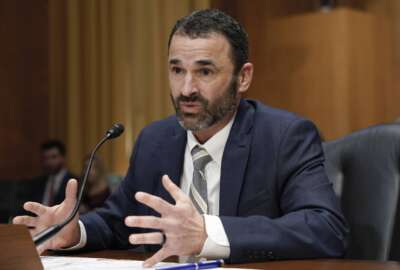Hubbard Radio Washington DC, LLC. All rights reserved. This website is not intended for users located within the European Economic Area.
On Air: Federal News Network
Trending:
Levin, Coburn leave legacy of bipartisanship, oversight
Sen. Carl Levin (D-Mich.) says "bipartisanship is not extinct" in his farewell speech to Congress. Wastebook author Sen. Tom Coburn (R-Okla.) says oversight is ...
When the new Congress convenes in January, some significant legislators will be absent from the congressional roll call due to retirements.
Among the longitme legislators stepping down this month are Sen. Carl Levin (D-Mich.) and Rep. Buck McKeon (R-Calif.), chairmen of both the Senate and House Armed Services committees, respectively; House intelligence Committee Chairman Mike Rogers (R-Mich.); and Sen. Tom Coburn (R-Okla.), government waste watchdog and ranking member of the Homeland Security & Governmental Affairs Committee. 
With the Republican Party taking control of the Senate in January, it would seem that the political gridlock that has dominated Congress in recent years will continue.
“Many foresee a continuation of polarization and partisanship in the Senate, and say it is naïve to suggest that the next Congress might come together, break out of gridlock and accomplish great things,” Levin said, in a farewell speech on the Senate floor. “But I know the Senate can do better — because I have seen it happen with my own eyes. The Senate has indeed demonstrated, even in our era, that bipartisanship is not extinct. The Senate Armed Services Committee has upheld a more than 50-year tradition of bipartisan cooperation to produce an annual defense authorization act that advances the security of our nation.”
On Friday, the Senate passed the Fiscal Year 2015 National Defense Authorization Act to fund the Defense Department through next year.
“Congress has come together over the years to make improvements in pay, benefits and health care for the men and women of the military; to reform the way in which we buy the weapons they use to carry out their missions; to adopt policies to protect them from sexual assault; to provide improved education benefits through a modern GI Bill; and to reform the way in which we care for our wounded warriors,” Levin said. “We are training and equipping the militaries of nations under assault by extremists and religious fanatics so that those nations can depend more on themselves for their security, and less on America’s sons and daughters. We have passed a defense authorization bill to accomplish these things each year for more than half a century by laying aside partisan differences for the common good. We have never allowed disagreements over policy to interfere with our duty to our troops and their families.”
On his congressional website, McKeon talked about the significance of the NDAA, which his committee passed in May and which passed the full House on a 315-108 vote.
“This is something that is very important for our service,” he said. “It gives them directions on how they function during the next year. It gives them the opportunity to start new programs, to discontinue programs that are not helpful, programs that are multi-funded like, for instance, ship building. We build an aircraft carrier, it takes five years and if we don’t get this bill passed, it would bring construction on the new aircraft carrier to a halt. It ends up costing us a lot more money.”
Continued bipartisanship over annual defense funding bill
Secretary of Defense Chuck Hagel lauded both Levin and McKeon in a speech Friday at Fort Myer, Virginia, for their longtime bipartisanship and ability to pass the NDAA year in and year out.
“With increasing pressure to reduce defense budgets; with a world growing more volatile and complex; and with the gears of government continuing to grind ever more slowly — Chairman Levin and Chairman McKeon have worked tirelessly to help provide the Department of Defense with the resources it needs to do its job,” Hagel said. “They have helped make our military stronger and our country more secure through their leadership on defense issues and their commitment to our troops and our nation.”
A number of Levin’s Senate colleagues stepped up Friday to the podium to honor him as he was about to begin his retirement.
Sen. Susan Collins (R-Maine) praised Levin’s 36-year career in the Senate, during which he has been hailed by the military as a leader in national security.
Levin’s fellow senator from Michigan, Democrat Debbie Stabelow, commended Levin on his commitment to the men and women of the military.
“No one has done more to ensure that our men and women in uniform are battle ready with supplies and technology they need to be the best military in the world other than Sen. Carl L.,” she said. “Or to make sure that they receive fair pay and full health benefits year after year after year coming to this floor and putting together the coalition to make that happen. He has never lost faith in government’s capacity to be a force for good.”
Sen. Jeff Sessions (R-Ala.), who has served on the Armed Services Committed in all of his 18 years in the Senate, credited Levin with having a lawyer’s ability in finding “the right words” when it comes to writing the committee’s legislation.
“That Armed Services Committee authorizes one-half of the discretionary budget of the United States,” Sessions said. “It impacts the lives of men and women in harm’s way right now. We need to get it right. It’s a lot of money and a lot of responsibility. I just think it’s really a well-run committee and sort of sets an example for what we ought to see more of in the Senate.”
Wastebook author steps down
The new Senate will also be missing one of its champions of oversight with the departure of Coburn, who has documented wasteful federal programs in his annual Wastebook. The most recent edition skewered questionable spending such as a $347,000 alternative medicine grant to examine the benefits of massage for rabbits and $350 million in funding for a NASA launch pad to support a rocket program that had been shut down four years earlier. 
“Each member of the Senate has a unique role to participate and practice oversight to hold the government accountable, and that’s part of our duties,” Coburn said Friday, during a farewell speech on the Senate floor. “Except, most often, that’s the part of our duties that is most ignored. To know how to reach a destination, you must first know where you are, and without oversight, effective, vigorous oversight, you’ll never solve anything. You cannot write a bill to fix an agency unless you have an understanding of the problem. And you can only know this by conducting oversight, asking the tough questions, holding the bureaucrats accountable, find out what works and what doesn’t, and know what has already been done.”
Coburn added that oversight is an effective tool the Senate can use to expose wasteful spending and government overreach.
“I’ve had some fun through the years taking some criticism for the Wastebook,” he said. “And it’s opinion, I agree. Everybody that’s in the Wastebook has a great defense of why it’s there. But the real question is, will we become efficient at how we spend the money of the American people? This is a big, big enterprise. There’s no other enterprise anywhere close to its size in the world. It’s not manageable unless we all agree to try to manage it and have the knowledge of it. I think there ought to be 535 Wastebooks every year, and then we ought to have the debate about where we’re not spending money wisely and have the information at our fingertips so we make great decisions.”
Sen. Tom Carper (D-Del.), chairman of the Homeland Security & Governmental Affairs Committee, said his relationship with Ranking Member Coburn was a productive one.
“I believe that the reason that Tom and I have had this partnership that I think has been productive, is one, we surround ourselves with people, certainly for me, smarter than us,” Carper said Friday on the Senate floor. “And the second thing is we believe in communicating, we believe in compromising and we believe in collaborating. And I think the American people are the beneficiary of that.”
Carper also called Coburn’s efforts on the Bowles-Simpson Commission, which was formed to identify policies that could improve the country’s fiscal sustainability, as work “for the ages.”
“He believes that we have a moral responsibility, a moral obligation to relieve the needs of our society,” Carper said. “But he also believes we have a fiscal obligation or a fiscal imperative to meet that moral obligation in a fiscally responsible way. And I think those two ideas will guide him in his work, and, frankly, it’s an inspiration to me.”
RELATED STORIES:
Senate OKs defense policy bill
Report blasts rabbit massages among gov’t waste
Copyright © 2024 Federal News Network. All rights reserved. This website is not intended for users located within the European Economic Area.
Michael O'Connell
Michael O’Connell is senior digital editor of Federal News Network optimizing content for the best user experience. Follow @moconnellWFED
Follow @moconnellWFED





